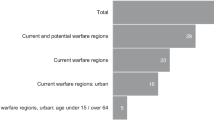
Overview
Presents a cutting-edge macroeconomic analysis of the effects and challenges of Russia’s invasion of Ukraine
Discusses the future long-term effects of EU policies and sanctions on Russian energy
Analyses Ukraine's relationship with the EU in the broader context of global economic relations
Access this book
Tax calculation will be finalised at checkout
Other ways to access
About this book
This book presents a cutting-edge analysis of the economic effects and challenges of Russia’s invasion of Ukraine, with a special focus on EU sanctions on Russian energy and Ukraine’s political relationship with the European Union in a global context.
Welfens outlines key macroeconomic perspectives on the ongoing conflict between Russia and Ukraine, highlighting in particular how sanctions posed by the international community will have a wider economic impact than what has so far been envisaged. The book discusses the effects of Russian gas supply boycotts against Western countries as well as global effects of an EU energy import boycott on Russia, especially for China and the Asian continent. An innovative proposal to cut electricity prices is presented. It also explores the challenges to relations between the EU, China and Russia caused by the invasion, the effects of the unfolding refugee crisis (within a post-Brexit EU), military and humanitarian aid pledges to Ukraine, and the risks of reduced multilateralism within the world economy as a direct result of the war. The book also analyses the risks and benefits of potential enlargement of the EU to integrate Ukraine as a member state. The topics covered by the book are all set within a long-run view of diplomatic and economic relations between the West, Russia and Ukraine.
The factors analysed here provide a new, broader picture of the international effects of the conflict, as well as its potential implications for policy design as we enter a new global order marked by the Russo-Ukrainian war. The book will be of interest to researchers and policy-makers working in international economics, new political economy, European politics and integration, and macroeconomics more broadly.
Similar content being viewed by others
Keywords
- Russo-Ukrainian war
- Energy embargo policy on Russian energy
- Ukrainian refugees and emigrants
- EU Ukrainian enlargement
- New global economic order
- European Union
- international aid in Ukraine
- gas supply boycott
- macroeconomic impact of Ukraine invasion
- Ukraine and China
- EU integration
- European enlargement policies
Table of contents (14 chapters)
-
Front Matter
-
The Background to the Russo-Ukrainian War and Contextual Factors
-
Front Matter
-
-
The Implications of an Energy Import or Export Boycott
-
Front Matter
-
-
Wider Economic Challenges Arising from the Russo-Ukrainian War
-
Front Matter
-
-
The Implications for a New Global Economic Order
-
Front Matter
-
-
Back Matter
Authors and Affiliations
About the author
Paul J. J. Welfens is a long-time researcher of Russian economic development and European integration as well as an expert on EU-US and EU-China economic relations. He is President of the European Institute for International Economic Relations (EIIW) at the University of Wuppertal, where he also holds the Jean Monnet Chair in European Economic Integration and the Chair of Macroeconomic Theory and Policy.
Bibliographic Information
Book Title: Russia's Invasion of Ukraine
Book Subtitle: Economic Challenges, Embargo Issues and a New Global Economic Order
Authors: Paul J. J. Welfens
DOI: https://doi.org/10.1007/978-3-031-19138-1
Publisher: Palgrave Macmillan Cham
eBook Packages: Economics and Finance, Economics and Finance (R0)
Copyright Information: The Editor(s) (if applicable) and The Author(s), under exclusive license to Springer Nature Switzerland AG 2022
Hardcover ISBN: 978-3-031-19137-4Published: 02 January 2023
Softcover ISBN: 978-3-031-19140-4Published: 03 January 2024
eBook ISBN: 978-3-031-19138-1Published: 01 January 2023
Edition Number: 1
Number of Pages: XL, 387
Number of Illustrations: 27 b/w illustrations
Topics: Political Economy/Economic Systems, International Economics, Natural Resource and Energy Economics, European Economics, Asian Economics



